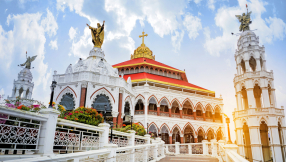Having an American wife, I spend quite a bit of time stateside. Last week I was in New York, catching up with friends, learning about the great social transformation work of Tim Keller's Redeemer Church in Manhattan and worshipping with the amazing Brooklyn Tabernacle Choir. I had a wonderful time, but the truth is my political mind was distracted by events over at Trump Tower.
President Trump. How did that happen? I still can't quite get my head around it. And why did the key evangelical vote so decisively swing behind him? He hardly represents family values and moral formation.
The answer is probably related to the fact that, although the Church bridges the Atlantic, there is a huge gulf between our respective modes of political engagement. While UK Christians are scattered across all the main parties and positions, in the US they are very much concentrated on the right and in the Republican Party. This wasn't always the case. Post Jimmy Carter, the capture of the Church by the right was made possible by a dogged, liberal purge of Christianity on the left. This alienation of the religious vote has propelled the Democrats down an ever-narrowing secular road. The result is that today, American society is neatly divided between the liberal/secular and the conservative/religious.
As the bitter presidential election contest showed, this 'culture war' shows no signs of a ceasefire. Indeed, for US Christians the battle-lines are clearer than ever. Most notably, following the federal redefinition of marriage, the election was fought against a backdrop of a litany of high-profile legal cases in which religion and LGBT rights clashed. With tensions heightened by Obama's presidential diktat for states to enforce transgender bathroom laws and Team Hillary's anti-Catholic statements, it was perhaps unsurprising that Democrats suffered such a defeat at the hands of the religious – especially with so many opting for what they believed was the 'least worst' candidate. Sadly, from my observations of the debates and comment in the US media, it seems that the Democrats remain unwilling to review their religion-alienating policies. So, this situation looks set to continue for the foreseeable future.
So, where does this leave the US evangelicals who voted for Trump? They may be relieved to have stopped Clinton, but what can they expect from a Trump administration? Given the erratic nature of the "the mud-slinging mogul with a complicated hair-do and a flair for the dramatic", it seems that they are viewing their new president with a mixture of expectation and trepidation.
Expectations relate to the delivery of the many grand promises made by Trump in the election. Alongside pledging an economic revival, 'the Donald' made strong public commitments to protect and promote religious freedom; review the controversial Roe v Wade abortion law judgment; and perhaps most significantly, de-liberalise the Supreme Court Justice appointments. Given the direct appeal of these pledges to the US evangelical Church, I discern a cautious optimism, which may need to be matched by patience and holding him to account.
In other policy areas, it seems that US evangelicals are less optimistic. Notwithstanding concerns about foreign policy and trade, these trepidations relate largely to Trump's character flaws and his egoism. His faith – or lack thereof – is related to a warmth for Christianity and the Bible, with a rejection of any need to repent.
Most seriously perhaps, alongside his denigration of women, the political scapegoating of ethnic minorities and the pledge to build a wall along the length of the US-Mexico border represents a particular challenge for a US Church that is increasingly black and Latino in flavour. Following Trump's astonishing tirade against Mexicans at the launch of his campaign I recall my Latino wife being visibly shaken.
Political opportunism is nothing new, and American politics has always been a brutal affair, but to maintain Church support (and social order) Trump will need to resist playing the race card in this way. After all, if he adopts just another form of the identity politics that characterises the left, he can expect a similar catastrophic effect. The Church vote mirrored a number of more general US demographic voting patterns in relation to age, class and urban/rural distinctions. However, in order to maintain broad evangelical support it is likely that he will need to reach out beyond his core white evangelical vote, because the US Church is changing.
Not far from Trump Tower is my wife's spiritual 'home' – Times Square Church. Established by David Wilkerson, this remarkable fellowship of thousands now has a global gospel focus. With 105 languages represented, it has above the main entrance the words from Revelation 7: "every tribe, tongue and nation". Hopeful, confident, unafraid of political engagement and yet with a strong focus of the saving and transforming gospel of Jesus, over the last six months, from the pulpit of this church I've heard sobering analyses of the challenges facing America accompanied by strong criticisms of both Obama and Trump. Here is a model of Church that welcomes, integrates and mobilises all for the gospel. A true model of diversity to re-fire the cooling US melting pot.
Let's hope, pray and work to see the Democrats find this kind of faith again, and that President Trump's American dream has a similar unifying and hopeful vision – "one nation under God, indivisible, with liberty and justice for all".
Dr David Landrum is director of advocacy for the Evangelical Alliance.













